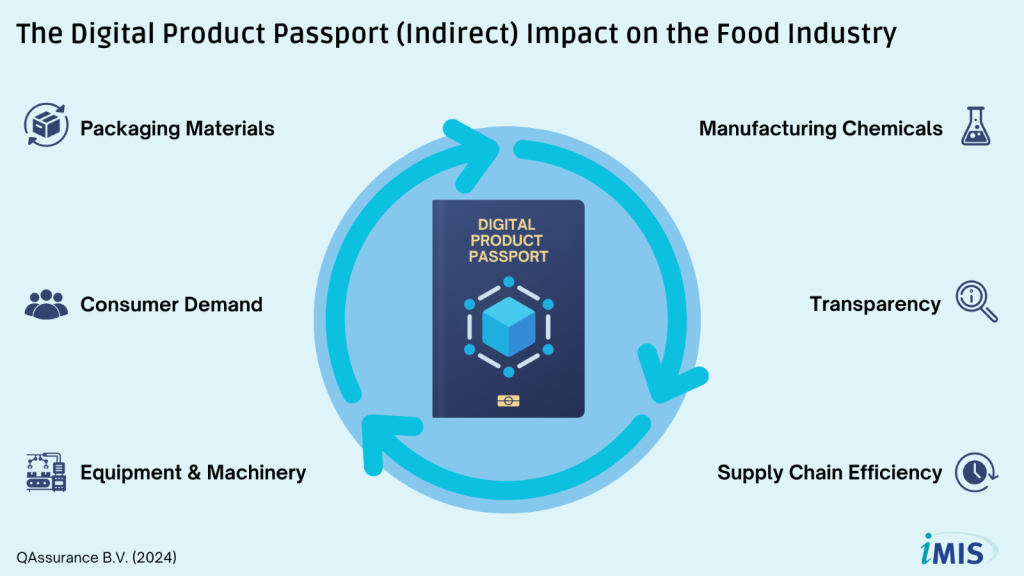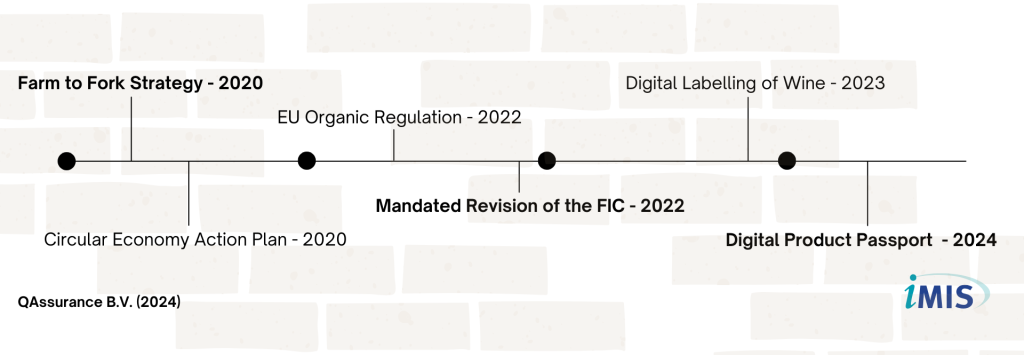Introduction
In an era where sustainability and responsible consumption are taking centre stage, the European Union is forging a new path with the introduction of the Digital Product Passport (DPP).
This groundbreaking initiative aims to revolutionize the way products are designed, manufactured, and consumed by creating a comprehensive digital record of a product’s lifecycle. While the DPP’s direct focus might not be on food, its ripple effects, coupled with a wave of new legislation, are set to influence the sector’s practices.
This article not only provides an overview of the DPP and its broader implications but also dives into the intricacies of evolving EU regulations concerning sustainability and transparency in the food industry.
Timeline and Implementation of the DPP
The foundation for this initiative lies in the Regulation establishing a framework for the setting of eco-design requirements for sustainable products (EU) 2024/1781, which was published in the EU Official Journal on June 28, 2024.
- The DPP legislation came into force on July 18, 2024.
- This regulation replaces the Ecodesign Directive 2009/125/EC
- Full implementation will be gradual, with timelines varying across sectors
General Boundaries of the DPP
The legislation broadly covers physical goods, excluding food, military equipment, and already-regulated products. Covered products must meet eco-design criteria like reusability, reparability, energy efficiency, recyclability, and low CO2 emissions. Specifics will be defined in delegated acts, with horizontal requirements for broader categories like textiles. Implementation timelines will be set, with at least 18 months between a delegated act’s entry into force and its application date.
Furthermore, product information on identification, materials, supply chain, use, end-of-life, and environmental impact must be accessible electronically, fostering transparency and informed decision-making.
DPP Implications for the Food Industry
Though DPP excludes food, its focus on sustainability and transparency could indirectly influence the food industry, fostering positive changes in traceability, resource efficiency, and consumer trust. However, adapting to new supply chain requirements and evolving consumer expectations could be disruptive.
General Implications for the Food Industry and Food Business Operators:
- Equipment and Machinery: The regulation could set eco-design requirements for equipment and machinery used in food production, this could impact production processes and costs.
- Packaging Materials: Though food packaging is technically exempt, the eco-design requirements for other products might influence the availability or cost of materials used in food packaging.
- Manufacturing Chemicals: While existing legislation addresses chemical safety, this new regulation targets chemicals that, although safe, negatively impact sustainability. This could affect chemicals used in food production, potentially leading to restrictions or reformulation of food products.
- Supply Chain Efficiency: If the legislation impacts the sustainability of other industries involved in the food supply chain (such as agriculture or transportation), there could be a knock-on effect on food production.
- Transparency: Increased traceability requirements for materials and equipment used in food production could impact logistics and supply chain management in the food industry.
- Consumer Demand: Growing consumer awareness of sustainability might increase demand for eco-friendly food. Though the DPP doesn’t apply to food, some producers may voluntarily adopt similar labelling practices.

Sustainability Impact on EU Food Law
The growing need for sustainability and transparency has had an influence throughout the food industry, prompting a shift in practices, regulations, and consumer expectations. As concerns about climate change, resource depletion, and ethical sourcing increase, the food sector faces pressure to adopt greener and more transparent options. Beyond, DPP, which does not directly affect the food industry, new initiatives and legislation aimed at fostering a more sustainable food system:
Farm-to-Fork Strategy
This ambitious EU initiative sets concrete targets for reducing the environmental and climate impact of food production and consumption. It encompasses various aspects, including pesticide reduction, sustainable agriculture, and food waste prevention, driving significant changes in the food industry.
EU Organic Regulation
This regulation establishes strict standards for organic food production, ensuring transparency and environmental integrity throughout the supply chain. Consumer demand for organic products has surged, prompting more producers to adopt sustainable farming practices.
Food Information to Consumers Regulation (FIC)
Currently under revision, the FIC aims to enhance transparency in food labelling. Proposed changes include mandatory original labelling for certain products and clearer information on environmental impact, empowering consumers to make informed choices. The new revision could also include digital labelling of food products.
Circular Economy Action Plan
This plan seeks to transition the EU towards a circular economy, where resources are used efficiently, and waste is minimized. The food industry plays a crucial role in this transition, and the plan encourages measures like reducing food waste and promoting sustainable packaging.

Navigating the Evolving Landscape of Food Legislation: iMIS Food
The food industry faces evolving regulations, with the EU’s focus on sustainability and transparency. iMIS Food is a software solution that helps businesses navigate these complexities. It offers real-time updates on regulations and tools to manage food safety and quality, ensuring compliance in an ever-changing landscape.
Key Benefits of iMIS Food for Navigating Legislation:
- Regulatory Updates: Provides information on EU food legislation changes
- Compliance Management: Helps businesses implement and maintain food safety practices aligned with EU regulations
- Expert Guidance: Offers access to food safety experts for personalized advice and support
- Continuous Improvement: Enables tracking, analysis, and corrective actions for ongoing improvement
- Global Reach: Supports international businesses with multiple language options
Sources
- [1] Digital Product Passport. (2023, May 11). European Health and Digital Executive Agency (HaDEA). https://hadea.ec.europa.eu/calls-proposals/digital-product-passport_en
- [2] Farm-to-fork strategy. (n.d.). Food Safety. https://food.ec.europa.eu/horizontal-topics/farm-fork-strategy_en
- [3] New rules for wine labelling enter into application. (2023, December 7). Agriculture and Rural Development. https://agriculture.ec.europa.eu/news/new-rules-wine-labelling-enter-application-2023-12-07_en
- [4] Proposal revision Regulation of FIC. (n.d.). Food Safety. https://food.ec.europa.eu/safety/labelling-and-nutrition/food-information-consumers-legislation/proposal-revision-regulation-fic_en#:~:text=Regulation%20(EU)%20No%201169%2F,the%20general%20principles%2C%20requirements%20and
- [5] Regulation – EU – 2024/1781 – EN – EUR-LEX. (n.d.). https://eur-lex.europa.eu/eli/reg/2024/1781/oj
Related articles to The DPP Ripple Effect: Its Impact on the Food Industry
Many customers and visitors to this page 'The DPP Ripple Effect: Its Impact on the Food Industry' also viewed the articles and manuals listed below:
